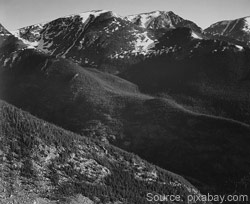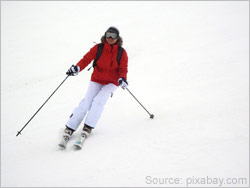 Just outside the booming Denver area is Colorado's third most populous city, named after the Roman Goddess of the Dawn, Aurora. Panoramic views of the Rocky Mountains and plenty of opportunity for outdoor adventures aren't the only draws to this ever-evolving city.
Just outside the booming Denver area is Colorado's third most populous city, named after the Roman Goddess of the Dawn, Aurora. Panoramic views of the Rocky Mountains and plenty of opportunity for outdoor adventures aren't the only draws to this ever-evolving city.
If you're weighing the pros and cons of moving to the Gateway to the Rockies, use the guide below to learn more about the city and what to expect if you choose to reside there.
Aurora Climate
Be prepared for an altitude adjustment if you're relocating to Aurora. The city's elevation is well over 5,000 feet above sea level, with some elevations higher than 6,000 feet. It's sunny in Aurora more than 250 days out of the year, with a semi-arid climate. The average highs in the summer can be up to 90 degrees with some heat waves and rainfall.
 Winters are typically anywhere from 15 degrees to 50 degrees, with an average snowfall of over 50 inches annually. The city has four distinct seasons; however, the temperatures in winter and summer tend to fluctuate more significantly than in fall and spring.
Winters are typically anywhere from 15 degrees to 50 degrees, with an average snowfall of over 50 inches annually. The city has four distinct seasons; however, the temperatures in winter and summer tend to fluctuate more significantly than in fall and spring.
Aurora Neighborhoods
Aurora is divided into North Aurora and South Aurora, with South Aurora claiming more planned communities and, as many locals say, better school districts and more upscale living than the North - a great place to raise a family. Some areas worth looking into are: Piney Creek (considered Centennial, CO), located North of Piney Creek and featuring almost 2,000 residences; Saddle Rock, which claims Saddle Rock Golf Course, shopping malls and a farmers market; and Sienna, located in Southern Aurora, which has great mountain views and large scale homes costing anywhere from $400,000 to $1 million.
Registering Your Car
Once being either gainfully employed in the state of Colorado, reside in Colorado for over 90 days, or own a business in Colorado, you must register your out-of-state vehicle within 90 days. Once becoming a resident, you have 30 days to qualify for a Colorado driver license.
If your vehicle was titled out of state, a Colorado law enforcement officer, motor vehicle dealer or emissions testing station must fill out the Verification of Vehicle Identification Number form. You will need this form, your current registration, proof of Colorado Vehicle Emissions, Proof of Insurance, payment of taxes and fees, and secure proof of identification.
Aurora Schools
If you have children that will need to be enrolled in public school, five school districts service the city of Aurora. These districts are: Aurora Public Schools, Cherry Creek Public Schools, Douglas County School District, Bennett Public Schools and Brighton Public Schools. Aurora Public Schools accounts for most of the schools in the area, with 55 total schools ranging from kindergarten to high school.
Post secondary and colleges in the area include: Columbia College - Aurora, Regis University, University of Colorado Denver (Anschutz Medical Campus), Community College of Aurora and Pickens Technical College.
Aurora Employment
In this city, the world of business enterprise thrives through vast amounts of land close to the Rocky Mountains, with reasonable lease rates and educated employees. Being part of the Denver metropolitan area, Aurora is part of an area that serves as a business hub for the United States, Canada and Mexico.
Popular industries include aerospace and bioscience, while business services suppliers and retail trade companies are also prominent. According to the Aurora Economic Development Council, The Children's Hospital, Raytheon Company and Kaiser Permanente are the top three largest employers in the city. The unemployment rate in Aurora is 7.4 percent as of January 2013, according to the Bureau of Labor Statistics, and the average salary made is approximately $45,000 annually.
Living Costs in the City
Thanks to reasonable state taxes and a relatively sound economy in comparison to national trends, settling down in Aurora could be a viable option for you. Though the average salary is just over $45,000 annually, the median household income averages at close to $100,000 in some of the areas more pricey neighborhoods, and $60,000 for the whole city. The median home price is approximately $140,000 while the average sale price is closer to $265,000. One-bedroom apartments in the area start at around $700 monthly.
Utility bills are about 12 percent lower than the national average - bills can range from $150-$300 per month for a 3,500-square-foot home, for example.
Aurora Moving Resources
Moving and storage companies are ready and willing to help you with your move to Aurora, whether you're moving from out of state or from another county in Colorado. Make sure you get estimates from multiple moving services before you commit to hiring any (at least three estimates). Check back to our guides for tips on how to choose your moving service wisely with important questions to ask, differentiating between types of estimates, and mistakes to avoid. Visit the following pages at Movers.com to get quotes for the following services:
Aurora Transportation
The Regional Transportation District's light rail transit system serves the Aurora area as far as public transportation goes, and was extended to Southwestern Aurora in 2006. There networks of smaller buses in southern Aurora. Improvements on the light rail are slated to be completed in 2017.
The major highways in Aurora include Interstate 70, Interstate 225 and the E-470 beltway.
Culture & Contemporary Life
 To stimulate your active side, the main attraction in Aurora is the more than 7,000 acres of developed park land and open space. If golf is your game, you'll appreciate one if not all of then seven award-winning golf courses, in addition to some privately owned courses all over the city. For indoor entertainment, The Aurora History Museum contains exhibits of the city's past and present, as well as some traveling exhibits that change often - all the more reason to keep coming back.
To stimulate your active side, the main attraction in Aurora is the more than 7,000 acres of developed park land and open space. If golf is your game, you'll appreciate one if not all of then seven award-winning golf courses, in addition to some privately owned courses all over the city. For indoor entertainment, The Aurora History Museum contains exhibits of the city's past and present, as well as some traveling exhibits that change often - all the more reason to keep coming back.
There are plenty of historic landmarks in the area, like the Gully Homestead of 1870, the Victorian-style Centennial House of 1890, and The DeLaney Round Barn of 1902, showcasing a city proudly steeped in history.
You won't get up close and personal with the mountains if you live in Aurora, as locals say the area is a bit more industrial than its neighbor cities like Denver, but you'll be close enough to take ski trips without any hassle. The food here is also diverse, ranging from Thai cuisine to Hawaiian BBQ to Mediterranean grills - allowing you to experience all sides of Aurora.
Aurora Relocation Tips
- If you're a runner, or into outdoor physical activity, you'll have to start off slow to give your body time to adjust to the altitude. Stay hydrated and wear sunscreen to protect against the sun's intense rays that high above sea level.
- Since most of your residential areas are scattered throughout the city, you'll have to do a considerable amount of research on the neighborhoods before choosing a location - don't be afraid to ask locals for help and advice.
- Acquire a wardrobe appropriate for all seasons. You'll probably be spending a lot of your time outdoors kayaking, canoeing, skiing or hiking - get a mix of shorts and t-shirts, down jackets and sweaters, snow and hiking boots, and sunglasses and wind breakers.